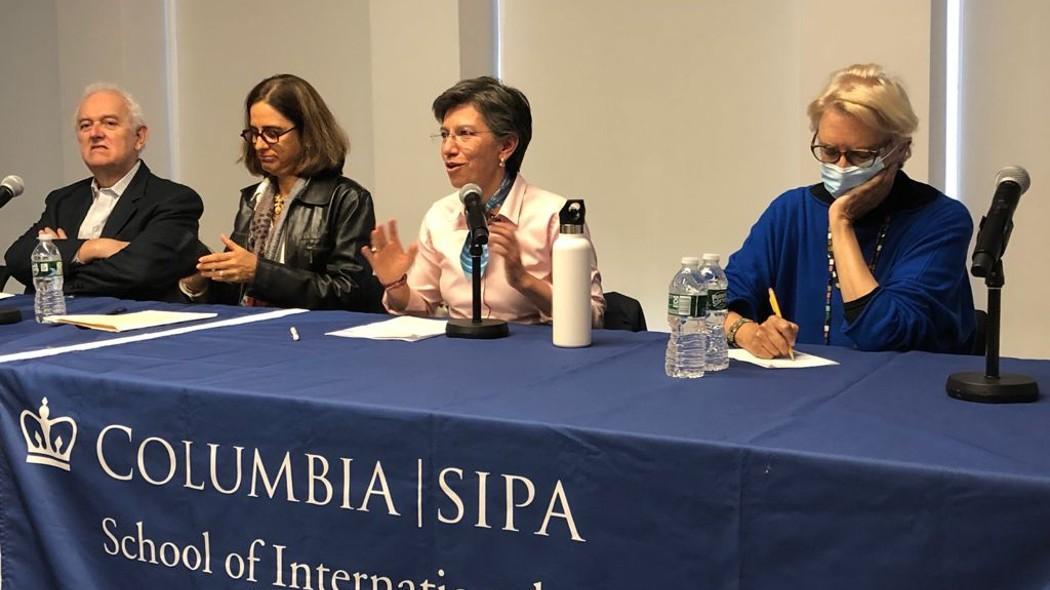This Wednesday, from Columbia University in the United States, the mayor of Bogotá, Claudia López, spoke about the District Care System, a strategy with which the district is generating great impact.
“In order to reduce gender gaps, women need to have a louder voice and greater participation, and that is just what we’re doing with the District Care System in Bogotá. We have to re-think our policy and infra-structure, to place women at the center, to help alleviate the burden of unpaid care and give them more control over their own outcomes.” emphasized Mayor López.
The mayor went on to praise the role that women have played in terms of political participation in the Nation's capital. This endeavour underlines the importance of care for the economic and political participation of women in Latin America: The case of Bogotá, organised by the University of Columbia.
Mayor López opened her talk by reminding her audience that the pandemic has caused a fair bit of damage, not only economically and politically, but also on a personal level. The two groups of people that have been consistently marginalised in the Colombian capital have been women and young people. These two groups feel disenfranchised and under represented by the leaders who govern them.
“In fact, we live in socio-economic conditions that have been achieved over the last 20 years that have been eliminated in a single year of pandemic. Every achievement was erased and will now require us to work twice as hard to recover lost ground. But we must be concrete on this one thing, we must concentrate on the well-being of women.” stated the Mayor López.
Bogotá has a female population of four million people, of which a staggering 3.6 million perform unpaid care-work. it is estimated that 1.2 million women, dedicate themselves exclusively to the care of those around them.
Mayor Claudia López went on to say that the District Care System is the union of various secretariats that make up the social sector of Bogotá. The primary function has always been to put the services of the Secretaries of Health, Education, Culture, Recreation and Sports; of Social Integration and Women, at the disposal of the each and every woman.
At the heart of this endeavour, the central axis where all the services meet are the Care Blocks scattered throughout the city. Mayor López specified the role The District Care System and its efforts to seek out and optimise facilities that were already established for the well-being of women in mind. These facilities will be adapted to create a space for women to come together. "They are set up, with a variety of rotating schedules that accommodate the people that they care for," specified the mayor. "Different services and activities have to be implemented for the different people under our care: women, children, the elderly, the disabled."
Mayor Claudia López was joined by the School of International Relations and Public Affairs (SIPA). She outlined how Bogotá has responded to the need for women's political participation through the District Care System (SIDICU).
Mrs. López was full of praise for the great innovations made by the District Care System, essentially the first its kind in Latin America. “This system connects women through the SIDICU network to generate more programs that enrich and educate. Programs that empower and result in a better quality of life. Programs that invite women to play a more active role in the political world around them. These programs have fundamentally changed the namesakes of many of the women who they are designed for.”
The event was attended by various experts and academics from Columbia University, Director of the Specialisation in Gender and Public Policy, Yasmine Ergas; Professor of International Affairs, José Antonio Ocampo; acting director of the SIPA Economic and Political Development Concentration, Eugenia McGill and as moderator, María Victoria Murillo, Director of the Institute for Latin American Studies.
For the mayor, the District Care System is the cornerstone of the city's economic re-activation strategy. It promotes women's access to employment and entrepreneurship. "We are working on income generation programs for youth and women, through alliances with the private sector, particularly in historically male-dominated sectors such as construction and transportation," Mayor López said.
With this District Care System, the Mayor's Office of Bogotá is building a city that puts the needs of care-givers at the front. "Thanks to this initiative," stated Mayor López, "in 11 months of operation, more than 26,000 cases have been documented of training and respite services being provided to care-givers, while simultaneously serving those whom they care for."
The mayor went on to add that “to reduce gender gaps, women need to have a greater voice and greater representation, and that is what we are doing in Bogotá with the District Care System. We are re-thinking our social services and infrastructure, to place women in the center, to help alleviate their burden of unpaid care and provide them with the tools to improve their lot in life.”
The event was attended by various experts and academics from Columbia University, Director of the Specialisation in Gender and Public Policy, Yasmine Ergas; Professor of International Affairs, José Antonio Ocampo; acting director of the SIPA Economic and Political Development Concentration, Eugenia McGill and as moderator, María Victoria Murillo, Director of the Institute for Latin American Studies, and the student body from that university too.
During the course of the discussion, Yasmine Ergas congratulated the mayor. “Understanding care as a fundamental element of public policy requires a radical imagination. I think that what Bogotá is doing to recognise itself in two cities with different realities and take services from the formal to the informal is totally innovative, this is truly re-distributive. There are many lessons to be learned here.”
During her intervention, Senior SIPA Lecturer, Eugenia McGill mentioned that one of the most interesting things about the District Care System is knowing that it is something that is already underway. "With initiatives like this one, we move from words to action quickly in order to meet the Sustainable Development Goals."
The floor was opened for the panellists to receive questions from the public, the attendees inquired about the alliance with the private sector and the viability of the District Care System. To which the mayor replied: “now we have a wonderful network of establishments and shops where women can report if they are under threat of violence or domestic abuse. Now, in terms of sustainability, although we started from scratch and some infrastructure has to be built, we are actually using services that already exist and giving them a differential approach, for example, adapting them to the schedules that serve women. So, the real question is not, how do we maintain it? but rather, why hadn't we done it before?"
By the end of the evening, Mayor Claudia López explained that what the system is seeking is a cultural shift. “How many of the male members of the family will have a real change of heart? That is real change. How many men from this program are going to get involved in care work alongside women? That is the real change? It is a cultural challenge!”
Bogota Mayor, Claudia López has studied Finance, Government and International Relations at the Externado de Colombia University and has a diploma in Urban Land Management at the Erasmus University of Rotterdam. She achieved a Master's degree in Public Administration and Urban Policy from Columbia University, in New York; and a Ph.D. in Political Science from NorthWestern University in the U.S.A.







